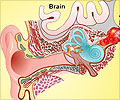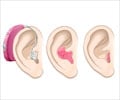Placing ear tubes in young children who develop fluid in the ears does not improve speech, hearing or psychological development, according to new
Placing ear tubes in young children who develop fluid in the ears does not improve speech, hearing or psychological development, according to new research.
Currently there are two reasons for ear tube surgery -- persistent, severe ear infections and liquid in the inner ear cavity of an otherwise healthy child. Doctors have been concerned that if surgery is not used in the second case, children could face long-term developmental impairment."We were led to the conclusion that ear disease does not cause any developmental problems," said Dr. Jack Paradise, University of Pittsburgh School of Medicine and lead researcher of the study, which appears in the New England Journal of Medicine.
Researchers assessed speech, language and cognitive and psychological development in children at age 3 who had experienced persistent fluid in the ears during infancy and very early childhood. In the study, children either got ear tubes immediately, or researchers waited up to nine months to do the procedure if the ear fluid persisted. In the group where doctors waited, one-third of the children eventually got ear tubes.
"To many doctors this will come as a surprise because it's been a matter of some controversy and speculation and some doctors are convinced it's a problem," said Paradise. There's been a perception that children with liquid in the ear have impaired hearing, which could impact language and neurological development.
"Two and 3-year-old children are learning sounds and words and we wonder if some children are going around hearing muffled sounds," said Dr. James Perrin, with MassGeneral Hospital for Children and author of an editorial accompanying the study in the New England Journal of Medicine. "It's hard to measure hearing in these children, and we wonder 'does it sound muffled?' -- 'does it sound different?'"
Ear fluid build-up is about as common as ear infection. Children with persistent ear fluid may not have symptoms, so the condition is often picked up during a routine physical exam. In other cases, a child will retain fluid after an ear infection has cleared up. Sometimes the two conditions can exist together.
Advertisement
Tubes' effect on hearing debated Perrin wrote in his editorial that the issue of surgery is an important one since it's often overused. A 1994 study found about one-fourth of ear tube insertions were inappropriate.
Advertisement
Ear tube surgery does have risks: the small, but real risk of anesthesia and concern about the long-term effect of the plastic tube in the ear. There are still questions about the tubes' impact on hearing decades later. The cost of surgery is about $2,000 to $3,000.
"This study should encourage families to be a bit more willing to wait to have their child undergo surgery," said Perrin.
Other doctors say the new findings will likely lead to discussions about re-evaluating current guidelines.
"It may be reasonable to delay ear tube surgery in some carefully defined groups," said Dr. James Lemons, who specializes in the study of hearing impairment at Indiana University. "Doctors should be aware of the pros and cons and carefully consider them."
For parents with children who are speech- and language-delayed, their problems are unlikely to be caused by a history of ear fluid, according to the study. But that doesn't mean that they should never get ear tube surgery.
"The decision to undergo ear tube surgery should be discussed carefully with the doctor," said Paradise. "A variety of factors go into this decision. If you think putting tubes in the child's ears is going to improve developmental outcome at age 3, the answer is: no, it won't."
Courtesy : PITTSBURGH, Pennsylvania (CNN)









